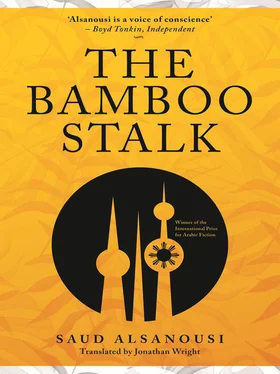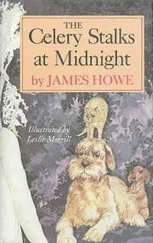I went up to a picture on one of the walls, a black-and-white picture of an old man with a very high forehead, unkempt hair, bushy eyebrows, a white moustache and a long, forked white beard that reached halfway down his chest. ‘I think I know who that is,’ I said, turning to Khawla.
She came over to me by the picture. ‘You should recognise him, Isa,’ she said.
I looked at her with a broad grin. ‘That’s Grandfather Isa, right?’ I said.
Khawla wanted to laugh but held it back. She rushed to the door of the room and locked it. Then she burst out laughing. ‘That’s Tolstoy, Isa,’ she said. ‘The famous Russian writer.’
I laughed with her to hide my embarrassment. To make amends for my mistake I pointed at another picture, of a man with the traditional headdress. The black ring on his head looked unusually thick. He was wearing a dark green coat and had a black, Hitler-style moustache. His eyes were covered by black glasses with round lenses. ‘Now this man doesn’t look Russian at all,’ I said, looking at Khawla, ‘even if he is wearing a Russian general’s coat. Would he be Grandfather?’
She covered her mouth with her hand to hold back her giggles and shook her head to say I wasn’t right this time either. ‘No, that’s an old Kuwaiti poet, a great poet,’ she said.
Although I was happy she was laughing, I was also embarrassed. ‘I won’t guess any more,’ I said firmly. ‘You tell me who the people in the pictures are.’
I pointed at a picture of a large man, taken in profile, wearing traditional Kuwait dress with a brown cloak. He had a small white beard in the middle of his chin. ‘Who’s that?’ I asked.
‘One of the emirs of Kuwait, the Father of the Constitution,’ she said.
I moved on to the next picture in the hope of finding my grandfather or some other member of my family, whose past I knew nothing about. On top of the desk I found a small picture in a wooden frame. I picked it up and while I was examining it, Khawla said, ‘I’ll tell you the story of the man in that picture. That young man. .’ she began.
‘I know, Khawla,’ I said, interrupting her. ‘I liked him without even meeting him. I’ve seen many pictures of him, and I know what finally happened to him when that plane was hijacked. It’s Walid.’
‘You seem to know a lot.’
‘My mother told me some things.’ I pointed to a picture of a woman in sunglasses with her mouth open singing into a microphone, her arms spread, carrying a handkerchief in one hand. ‘Who would that be?’ I asked my sister.
She showed no interest in my question but rushed over to one of the shelves, saying, ‘If you want to see a picture of Isa al-Tarouf, our grandfather.’ She took out an enormous book and offered it to me. I took hold of it and looked at the picture on the cover. It was a very old picture of two men. I think it was originally in black and white and had been coloured by hand later. One of the men had a short beard like the Emir who had died on the day I arrived, but he didn’t have the Emir’s smile. The other man had neither beard nor moustache. The one with the small beard was wearing traditional dress under a cloak, while the other was wearing a white thobe under a black waistcoat, with a small chain that was probably connected to a watch in his pocket. The rings holding their headdresses in place on their heads didn’t look like the black rings they use these days. They had black blocks linked together by thick yellow cord to look something like a crown. Khawla pointed to the man with the small beard. ‘That’s Papa Isa, our grandfather,’ she said. She moved her finger to the other man. ‘And that’s his younger brother, Shahin,’ she added. It was an enormous book, with high-quality paper and many pictures of old maps, wooden ships and houses made of mud.
‘What does the book say about grandfather and his brother?’ I asked.
Before she had time to answer, the study door flew open and slammed against the wall. I shuddered at the sight of Grandmother leaning on the Indian maid with one arm and holding the door frame with her other hand. She was scowling and, without looking at me, she scolded Khawla with words I didn’t understand. Khawla blushed, then took Grandmother’s arm to support her in place of the maid. She turned to me in embarrassment and said, ‘You’d better go back to your room, Isa.’
Khawla told me later that Grandmother didn’t trust me and had blamed me for the fact that Khawla and I had been alone in the study together with the door closed. ‘You shouldn’t be together. If a boy and a girl are alone together, the devil soon joins them,’ Grandmother told her.
Khawla went off with Grandmother. I went back to my room, leaving the devil alone in the study.
11
On the morning of the next day, I woke up early to a voice calling the two maids: ‘Miri, Luza, Miri, Luza.’ I didn’t hear either answering. The same voice started angrily calling someone else, but I couldn’t make out the other name. I went to the bathroom, which was between my room and the room of Raju and Babu. Old Babu was looking at me through the kitchen window. I ignored him. In the inner courtyard Raju was holding a hose and spraying water on the floor to wash it. He looked at me too. They both looked suspicious of me, as if to say ‘Who’s this intruder?’ My self-confidence replied, ‘I’m one of the family.’ I felt that even the door of the bathroom I shared with Raju and Babu saw me as an intruder on their space. Neither of them approached me to talk to me, and I didn’t take the initiative either. The instructions not to mix seemed to have reached them too. I washed my face and brushed my teeth, but so early in the morning I couldn’t bring myself to have a shower when it was so cold outside.
Back in my room I didn’t know what to do. What next? I thought. I began switching the television from channel to channel. Nothing interesting. I sat down at the laptop and browsed the Internet. My stomach told me it was empty. I was hungry. They hadn’t offered me anything for supper the previous night. Had they perhaps prepared this fully equipped room for me but forgotten that I needed to eat? I opened the little fridge in the corner. Tins of milk, orange juice, mango, soft drinks, mineral water, fruit, apples, oranges and pineapple. As soon as I caught sight of the pineapple I shut the fridge door, with memories of the story of Pinya and Mendoza’s ranting.
I picked up the phone that Hind had given me. It was a new Nokia with one camera at the front and one at the back. I was reluctant to call Khawla and ask her for something to eat. Just as I was calling Ghassan to ask him what I should do there was a knocking on the door and I called off. I opened the door and there was Babu looking dour. ‘ Taal ,’ he said, then turned his back and walked towards the kitchen. The word wasn’t new to me at all. Taal was the name of the famous volcano in Batangas province. I stood in the doorway, unsure what the old Indian might have meant. Did he really mean the Batangas volcano? He went back to the kitchen without looking back. I was still standing there looking towards the kitchen, which was next to the annex. Babu leaned out of the window, beckoned me and shouted, ‘ Taal !’ Apparently the volcano was about to spew lava. I went to where he was beckoning. He pulled back a chair at a small table and put a glass of milk down among various dishes: fried eggs, boiled eggs, cheese, olives, slices of tomato and cucumber. He gestured to me to sit down, then turned to the stove, where he resumed his work.
I began to eat in silence. I wish Khawla could eat with me , I said to myself.
Before I’d finished, Luza, the Filipina maid, came in with a large round tray carrying the remains of a meal not much different from what I had been offered. The maid smiled at me. ‘How are you?’ she asked in my language, which I missed.
Читать дальше












